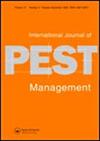腰果(Anacardium occidentale L.)害虫及其管理:孟加拉国农民的知识和实践
IF 1.1
4区 农林科学
Q3 ENTOMOLOGY
引用次数: 0
摘要
摘要孟加拉国腰果(Anacardium occidentale L.)农民由于缺乏对腰果害虫的认识和管理措施,在生产高质量腰果方面面临挑战。为此,从2020年6月到2022年12月,对144名腰果农民进行了调查。在腰果的21种害虫中,茶虫(70.1%)、腰果根茎蛀虫(52.8%)、苹果和坚果蛀虫(45.8%)位居首位。病虫害以嫩叶侵染最多(49.8%)。总体而言,56.3%的农民认为虫害造成了11-20%的产量损失,9%的农民认为腰果果园的产量损失可能超过40%。尽管采用了物理(7.7%)和机械(7.6%)虫害管理策略,如手工采摘、使用煤焦油、煤油和黄色粘捕器来控制害虫,但大多数农民(84.7%)依赖化学农药。与其他农民相比,受过教育的年轻农民对非化学有害生物管理选择更感兴趣。农民认为,除草、修剪等跨文化操作可以减少腰果果园的虫害。作者感谢孟加拉国科学技术部、大学教育资助委员会(UGC)的资金支持,使这项工作得以顺利完成。作者还感谢腰果农民和孟加拉国班达班地区的副助理农业官员(SAAO)在本研究过程中的奉献和合作。最后但并非最不重要的是,我们要感谢美国北达科他州立大学“作家中心”(CFW)的英语语言检查和语法纠正。作者贡献本研究由所有作者合作完成。作者dr . Fuad Mondal和Tareq Ahmed设计了这项研究。Fuad Mondal博士、Tareq Ahmed博士、Mehedi Hasan博士、Pallab Kumar Paul博士和Omar Faruque博士对农民进行了调查。Tareq Ahmed, najmol Hoque博士和Sourav Mohan Saha进行了统计分析并解释了数据。Tareq Ahmed写了整个手稿。Fuad Mondal博士、Mehedi Hasan博士和Najmol Hoque博士对手稿进行了修改和改进。所有作者都仔细审阅并批准了手稿的最终版本。披露声明作者声明无利益冲突。数据可用性声明不适用。该研究由科学技术部、孟加拉国人民共和国政府和孟加拉国大学教育资助委员会(UGC)资助。本文章由计算机程序翻译,如有差异,请以英文原文为准。
Cashew ( Anacardium occidentale L.) insect pests and their management: farmers’ knowledge and practices in Bangladesh
AbstractCashew nut (Anacardium occidentale L.) farmers are facing challenges producing quality nuts due to inadequate knowledge of cashew insect pests and their management practices in Bangladesh. For this reason, a survey of 144 cashew farmers was conducted from June 2020 to December 2022. Tea mosquito bug (70.1%), cashew stem and root borer (52.8%), and apple and nut borer (45.8%) were the top-ranked among 21 insect pest species of cashew. The highest insect pest infestation was observed in the tender leaves (49.8%). Overall, 56.3% farmers noticed 11–20% yield losses caused by insect pests, while 9% of the farmers believed that yield losses could be more than 40% in cashew orchards. Although physical (7.7%) and mechanical (7.6%) pest management tactics, like hand-picking, use of coal tar, kerosene, and yellow sticky traps were used to control pests, most farmers (84.7%) relied on chemical pesticides. Young and educated farmers were interested in non-chemical pest management options compared to their counterparts. Farmers believed that intercultural operation like weeding and pruning could reduce insect pests in cashew orchards.Keywords: Cashewfarmersinsect pestssurveymanagementBangladesh AcknowledgmentsThe authors gratefully acknowledge the Ministry of Science and Technology, University Grants Commission of Bangladesh (UGC) for their financial support that enabled the successful completion of this work. The authors are also grateful to cashew farmers and the Sub-Assistant Agricultural Officer (SAAO) of the Bandarban District of Bangladesh for the dedication and corporation during the course of this study. Lastly but not least, we would like to acknowledge “The Center for Writers (CFW)”, North Dakota State University, USA for English language checking and grammatical corrections.Author contributionThis research was conducted in collaboration by all authors. Authors Md. Fuad Mondal and Tareq Ahmed designed the study. Md. Fuad Mondal, Tareq Ahmed, Md. Mehedi Hasan, Pallab Kumar Paul, and Md. Omar Faruque conducted the surveyed with farmers. Tareq Ahmed, Md.Najmol Hoque, and Sourav Mohan Saha performed the statistical analysis and interpreted the data. Tareq Ahmed wrote the whole manuscript. Md. Fuad Mondal, Md. Mehedi Hasan, and Md. Najmol Hoque revised and improved the manuscript. All authors carefully reviewed and approved the final version of the manuscript.Disclosure statementAuthors declare no conflict of interest.Data availability statementNot applicable.Additional informationFundingThe research was funded by the Ministry of Science and Technology, Government of the People’s Republic of Bangladesh and the University Grants Commission of Bangladesh (UGC).
求助全文
通过发布文献求助,成功后即可免费获取论文全文。
去求助
来源期刊
CiteScore
4.70
自引率
6.70%
发文量
74
审稿时长
>12 weeks
期刊介绍:
International Journal of Pest Management publishes original research papers and reviews concerned with pest management in the broad sense, covering the control of pests (invertebrates, vertebrates and weeds) and diseases of plants, fungi and their products – including biological control, varietal and cultural control, chemical controland interference methods.
The management of invasive species is of special interest. We also encourage submissions dealing with interactions of multiple pests such as arthropods and plant pathogens, pathogens and weeds or weeds and arthropods as well as those dealing with the indirect and direct effects of climate change on sustainable agricultural practices.

 求助内容:
求助内容: 应助结果提醒方式:
应助结果提醒方式:


